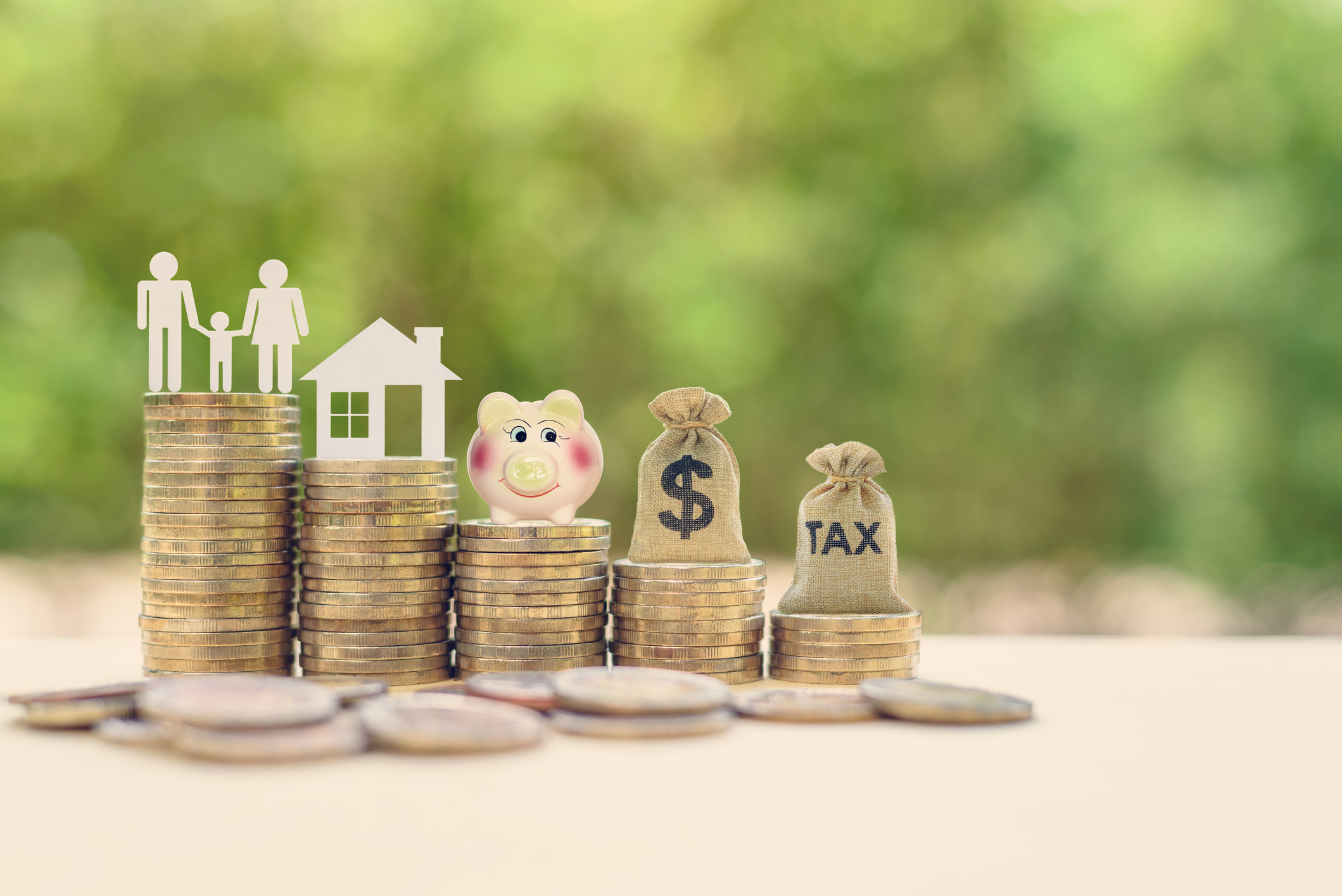
If you’ve been watching the news recently most of the information about the stock market has been dismal. You’ve probably read headlines that scream intense verbiage like “Stocks Collapse!”, “Stocks Get Punished!”, “Stocks in Free-Fall!” or something of the like. You’ve probably heard financial jargon thrown around such as “bear market”, “volatility” or “recession” as well. Your retirement account has almost certainly lost value and with all this negative news and you may be worried and considering selling your investments too. Before you pull the trigger . . . STOP. As financial advisors we understand that it can be scary watching your life savings drop in value day after day. But we STRONGLY discourage selling stocks during a stock market drop. In this post we thought it would be a good idea to discuss the topic of risk, and why you should take a step back and review your long-term goals before making any irre versible moves with your investments.
What is risk?
Merriam Webster defines risk as the “possibility of loss or injury” . By this definition, and common consensus, we encounter risk every day . As (relatively) rational beings, our job is to weigh the pros and cons of each decision, the risk, and act in the most appropriate way we can.
For instance, when you wake up in the morning to go to work there is a possibility of getting a car accident during your commute. You need to weigh th at risk against not going to work and thus foregoing getting important things done, or your paycheck entirely. Another example would be the decision to get pizza for lunch this afternoon. You are weighing the short-term satisfaction of enjoying a warm, cheesy, delicious slice of pizza to sticking to a healthy diet which will benefit you r health long-term.
In short, there are risks to every decision we make. The important thing is managing these risks, and weighing the pros and cons, to make the best decision possible. Is a slice of pizza every now and then isn’t going to ruin your health? Probably not. But will eating pizza for every meal? Most likely. All decisions in life come with striking a balance, and more importantly understanding the risk you are taking.
One of the worst decisions you can make is taking an action without understanding the consequences. When you do this , you’re relying on luck instead of making an informed decision. All too often this is true when it comes to investments. Selling your investments when the market is going down may feel relieving in the near-term, but what is the risk for the long-term? As financial advisors our job is to educate our clients on the risks and pros/cons of making financial decisions. This, of course, includes the financial repercussions of managing your investments.
What are your investment risks?
The common assumption is that stocks are “risky ” and bonds are “safe”. But is this really true ? Well, it depends about what kind of risk you’re referring to, because just like everything else in life there are tradeoffs for everything.
Risk of stocks:
Most people who invest are familiar with the general risk of stocks. As we’ve seen over the last few weeks, they can go down in value, and sometimes fairly quickly . But does this mean that you should sell your stocks? Absolutely not! Historically stocks have always recovered and have provided patient investors returns that exceed the cost of living. We could show chart s and graphs to prove this point, but that would not be helpful . The feelings you are having now are largely emotional. They are valid feelings, worth talking about…but pause before you act on them.
Risk of bonds:
At a high-level, bonds are generally considered “safer” than stocks. We could go into the technical details on how it depends on what types of bonds you hold, but that goes beyond the scope of this post. Assuming that you are holding quality bonds, it is generally true that they are more immune to short-term swings in the stock market. They often provide a cushion to an investment portfolio when stocks are falling. In that sense, yes, bonds are safer. However, this does not tell the whole story when it comes to the risk of bonds.
Bonds, unlike stocks, historically have not kept up as well with cost of living. A decent proxy of price increases over time is the cost of a stamp. Taking an approximate 30-year time frame, the cost of stamp in 1988 was 25 cents. About 30 years later, in 2019, they cost 55 cents . The cost more than doubled in a little over 30 years ! Price increases over time are true not only of stamps, but of almost every product or service we buy.
U.S. Treasury Bonds are yielding about 3% per year over 30 years. If your expenses are $75,000 per year, you would need to own $2,500,000 of these bonds to pay for your expenses today. ($2,500,000 x 3% = $75,000). Note that amount does not increase, but your $75,000 expenses will likely double to $150,000 over the next 30 years. This is why bonds are referred to as “fixed income” investments.
Stocks v s. b onds
Stocks pay dividends. The stock dividend of the S&P 500 was $11.06 in 1989 1 . It was $58.80 in 2019, an increase of 530%. (Incidentally, the stamp price increase was only 220% in that same time period). That doesn’t factor in the increase in value of the stocks over the same period.
Historically, the cost of everything increase s over time (this is known as “inflation”) . If all your money is invested in bonds, you need to save much more money for a secure retirement . This is because fixed-income investments like bonds do not generate the long-term rates of return that stocks do , and the income generally doesn’t increase over time . Stocks historically have exceeded the cost of living, while bonds struggle to keep up.
What should you do right now?
Focus on your financial planning. If you don’t have a qualified financial advisor, find one. Don’t make changes to your portfolio without working with a professional. We have been preaching to our clients for years that the stock market will go down significantly in value at some point. We didn’t know when, we didn’t know how far, and we didn’t know how long it would last, but we knew it would come eventually. Our job as advisors is to do our best to prepare our clients mentally that this would occur and explain that it is a natural course of the stock market.
Although past performance does not predict future results, we have no reason to believe that this most recent market downturn will be any different. Analysts said that the market crash of 2000 was different than the past . . . it wasn’t. September 11, 2001 was different…until it wasn’t. Then many said that the market downturn in 2008-2009 was different . . . it wasn’t. Analysts today may be saying the sky is falling and that this market downturn will be different, but if history is any guide, it won’t be. Stocks will almost certainly recover, and the swings upward may be just as extreme as this drop. Stocks can, and do, go down in value in the short-term, but they have historically rewarded long-term investors.
It is impossible to accurately time the market. In attempting to do so you have to be right twice. First, you need to know when to get out, then you need to know when the right time is to get back in. This is essentially impossible to do, and there is a great risk of either selling out too late or missing most of the recovery. Alternatively, there are things you can do outside of investments to prepare for the coronavirus, which we wrote in another post .
If you’re working with a qualified financial advisor, they should understand your cash-flow needs so that you have the required money out of the stock market to avoid this risk. This is also why it is so important to have a portion of your portfolio invested in bonds or other fixed income investments.
Many retiring or retired investors are feeling they DO need this money in the short-term. However, that is not usually the case. You need a very small PORTION of the money every month, to fund your living expenses. This is the point of the bond portion of your portfolio – to act as a cushion, so when stocks fall, your bonds can fund your monthly withdrawal. If you want to feel better, ask your advisor how much money is in bonds and cash. Often it is years’ worth of withdrawals.
Summary
Investment risk comes in many forms beyond stocks temporarily decreasing in value. If you don’t have a qualified financial advisor, now is a great time to find one. They can review your situation and help provide some clarity on the risk of stocks and how it relates to your long-term goals and prevent you from making a decision that can permanently derail your retirement plans.
If this is you, we encourage you to reach out to speak with one of our advisors .
Additional Resources:
- CDC Coronavirus resource page
- CDC actions and response
- CDC: Coronavirus symptoms
- CDC Coronavirus preparedness
- FEMA disaster preparedness resources



